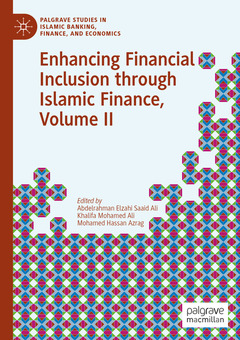Enhancing Financial Inclusion through Islamic Finance, Volume II, 1st ed. 2020 Palgrave Studies in Islamic Banking, Finance, and Economics Series
Coordonnateurs : Elzahi Saaid Ali Abdelrahman, Ali Khalifa Mohamed, Hassan Azrag Mohamed

This book is the second of two volumes which highlight the concept of financial inclusion from the Islamic perspective. An important element of the Sustainable Development Goals (SDGs), financial inclusion has been given significant prominence in reform and development agendas proposed by the United Nations and G-20. The significance of Islamic financial inclusion goes beyond improved access to finance to encompass enhanced access to savings and risk mitigation products, as well as social inclusion that allows individuals and companies to engage more actively in the real economy. It represents one of the important drivers of economic growth.
This volume explores the financial risks associated with lending to low-income groups due to high poverty levels and the lack of collateralization mechanisms. The first book on the market to provide empirical evidence of Islamic microfinance, deposit insurance and micro-entrepreneurship through the analysis of models and country case studies, this edited collection will be of value to those researching development finance, financial inclusion and Islamic finance.
Part I. Islamic Financial Inclusion for Sustained Growth and Poverty Alleviation.- 1. Introduction; Abdelrahman Elzahi Saaid Ali, Khalifa Mohamed Ali and Mohamed Hassan Azrag.- 2. Financial Inclusion for Poverty Alleviation: The Role of Islamic Finance in Bangladesh; M. Mizanur Rahman.- 3. Does Bank Concentration and Financial Development Contribute to Economic Growth? Evidence from OIC Countries; Edib Smolo.- 4. Using Islamic Banking to Improve Financial Inclusion in Selected States of Northern Nigeria: The Case of Jaiz Bank PLC; Adamu Usman Abubakar.- 5. Financial Inclusion Disclosure in Islamic Microfinance: The Case of Baitul Mal Wa Tamwil; Rahmawati, Hafiz-Majdi Ab.Rashid, Hairul Azlan Annuar and Siti Alawiyah Sira.- 6. Public Awareness and the Role of Islamic Deposit Insurance in Promoting Financial Inclusion; Salisu Hamisu and Rusni Hassan.- 7. Islamic Financial Inclusion for Agriculture Development: The Case of South AL-Dweim Agricultural Microfinance Projects in the White Nile State, Sudan (2016-2018); Elkhidir Elamin Mohammed Abdelrasoul.- 8. Enhancing Financial Inclusion through Sustainable Islamic Microfinance in Pakistan: A Participatory Products Development Perspective; Muhammad Khaleequzzaman.- Part II. Islamic Financial Inclusion for Sustained Growth and Poverty Alleviation.- 9. Enabling Mobile Microfinance: Opportunities and Challenges; Abdelrahman Elzahi Saaid Ali and Khalifa Mohamed Ali.- 10. The Role of Islamic Finance in Achieving Economic Growth: An Econometric Analysis of Pakistan; Syed Muhammad Abdul Rehman Shah, Kashif Raza and Shaherbano.- 11. The Impact of the Islamic Banking Industry on Economic Growth and Poverty Reduction in Pakistan; M. Abubakar Siddique, Miraj-ul-Haq and Memoona Rahim.- 12. Alleviating Poverty through Islamic Microfinance: Factors and Measures of Financial Performance, and Roles of Islamic Values and Financial Policies; Adhitya Ginanjar and Salina Kassim.- 13. Achieving Sustainability in Sudan through Microfinance and Mobile Banking; Elsadig Musa Ahmed and Anwar Ammar.- 14. Success Factors of the i-Taajir Micro-entrepreneurship Model: Lessons for Islamic Banks and Muslim Universities; Mustafa Omar Mohammed, Mohamed Aslam M. Haneef, Norma Md Saad and Rafe Haneef.- 15. The Role of Islamic Microfinance in Enhancing Financial Inclusion in Bauchi State, Nigeria: An Empirical Study; Aliyu Dahiru Muhammad and Sa'adatu Aminu Ibrahim.
Abdelrahman Elzahi Saaid Ali is a Senior Economist at the Islamic Research and Training Institute (IRTI) of the Islamic Development Bank (IsDB). Before joining IRTI, he was Associate Professor of Economics at Sudan University of Science and Technology. Abdelrahman has written and edited a number of academic publications, including Revitalization of Waqf for Socio-Economic Development (Palgrave, 2019).
Khalifa Mohamed Ali is a Senior Economist at IRTI. Before this, he was Associate Professor of Economics at the United Arab Emirates University, and taught economics at Iowa State University, USA, where he also studied. Khalifa is the Editor of the Arabic edition of Islamic Economic Studies, one of IRTI's flagship publications, and has published extensively in the area of Islamic finance.
Mohamed Hassan Azrag is Assistant Professor in the Faculty of Administrative Sciences, Ibn Sina University, Sudan. Prior to this he studied Accounting and Finance at Sudan University of Science and Technology where he gained his FCCA qualification.
Focuses on Islamic financial inclusion for sustainable growth and sustainability
Illustrates how to enhance poverty alleviation and achieving sustainable development through Islamic microfinance
Presents empirical case studies of Islamic financial inclusion being applied in various countries, including examples of micro-entrepreneurship, Islamic deposit insurance and financial inclusion in agriculture
Date de parution : 07-2021
Ouvrage de 373 p.
14.8x21 cm
Disponible chez l'éditeur (délai d'approvisionnement : 15 jours).
Prix indicatif 158,24 €
Ajouter au panierDate de parution : 07-2020
Ouvrage de 373 p.
14.8x21 cm
Disponible chez l'éditeur (délai d'approvisionnement : 15 jours).
Prix indicatif 158,24 €
Ajouter au panier


